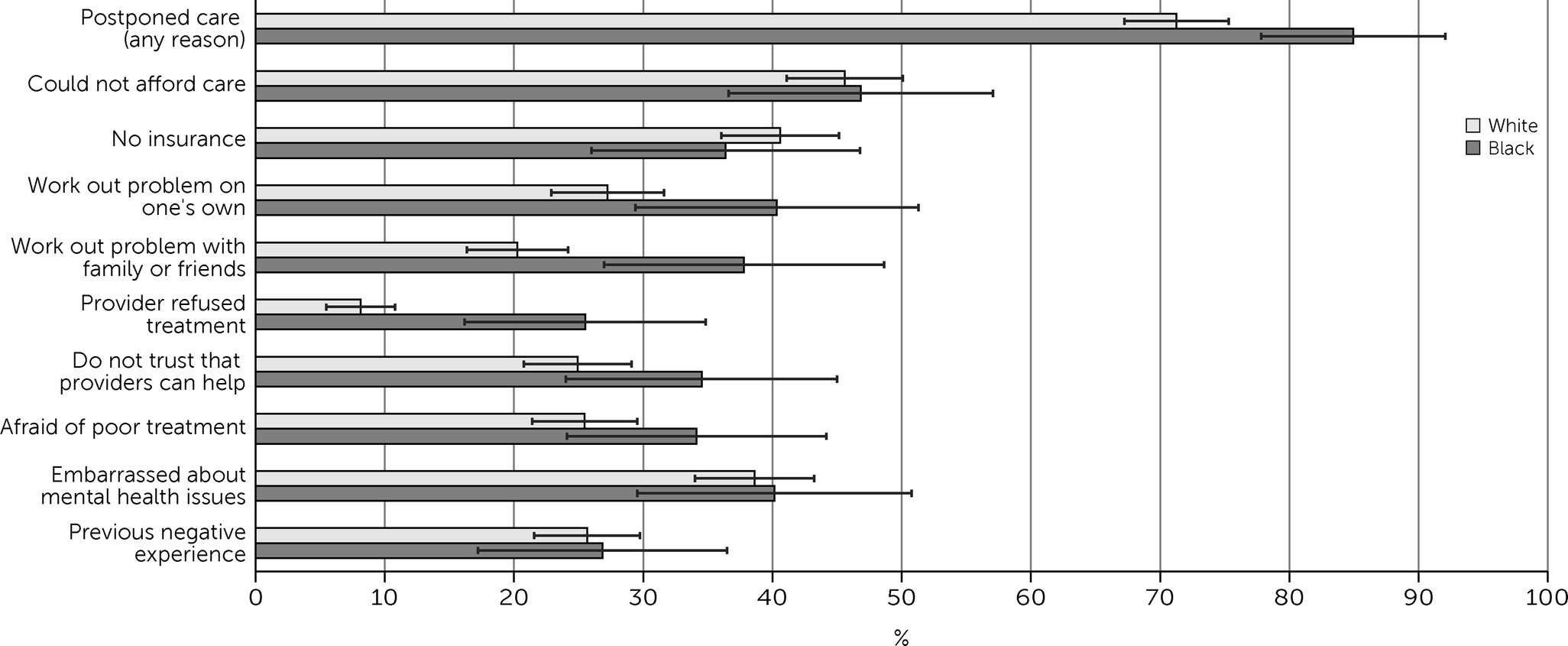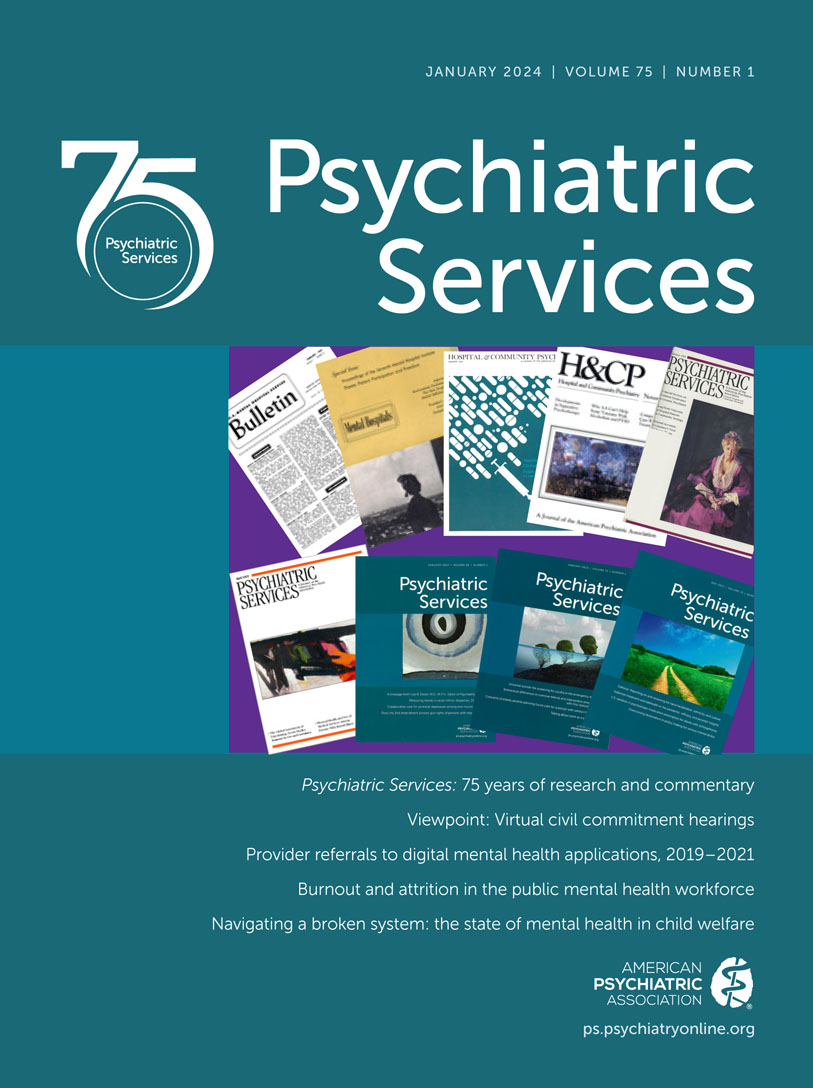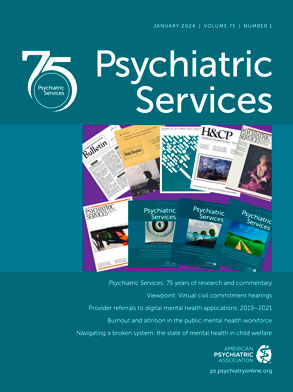Black Sexual Minority Adults’ Avoidance of Professional Mental Health Care
Abstract
Objective:
Methods:
Results:
Conclusions:
HIGHLIGHTS
Black Sexual Minority Individuals, Minority Stress, and Mental Health Management
Understanding Black Sexual Minority Persons’ Reasons for Avoiding Care
Methods
Data Source and Sample
Measures
Analytic Strategy
Results
| Total (N=476) | Black (N=78) | White (N=398) | |||||||
|---|---|---|---|---|---|---|---|---|---|
| Characteristic | N | % | N | % | N | % | Test statistic | df | p |
| Sex | χ²=6.14 | 1 | .01 | ||||||
| Male | 256 | 54 | 52 | 67 | 204 | 51 | |||
| Female | 220 | 46 | 26 | 33 | 194 | 49 | |||
| Family income ($) | χ²=1.89 | 4 | .75 | ||||||
| <30,000 | 98 | 21 | 14 | 18 | 84 | 21 | |||
| 30,000–49,999 | 132 | 28 | 24 | 31 | 108 | 27 | |||
| 50,000–69,999 | 100 | 21 | 18 | 23 | 82 | 21 | |||
| 70,000–89,999 | 72 | 15 | 13 | 17 | 59 | 15 | |||
| ≥90,000 | 74 | 16 | 9 | 12 | 65 | 16 | |||
| Education | χ²=6.33 | 2 | .04 | ||||||
| High school or less | 45 | 9 | 3 | 4 | 42 | 11 | |||
| Some college | 114 | 24 | 14 | 18 | 100 | 25 | |||
| College degree or more | 317 | 67 | 61 | 78 | 256 | 64 | |||
| Ever talked to mental health provider | χ²=1.71 | 1 | .19 | ||||||
| No | 212 | 45 | 40 | 51 | 172 | 43 | |||
| Yes | 264 | 55 | 38 | 49 | 226 | 57 | |||
| Age (M±SD years) | 33.9±8.8 | 32.7±7.7 | 34.2±9.0 | t=1.38 | 475 | .17 | |||
| Postponed (any reason) | χ²=4.43 | 1 | .04 | ||||||
| No | 125 | 26 | 13 | 17 | 112 | 28 | |||
| Yes | 351 | 74 | 65 | 83 | 286 | 72 | |||
| Could not afford care | χ²=.03 | 1 | .86 | ||||||
| No | 258 | 54 | 43 | 55 | 215 | 54 | |||
| Yes | 218 | 46 | 35 | 45 | 183 | 46 | |||
| No insurance | χ²=1.69 | 1 | .19 | ||||||
| No | 286 | 60 | 52 | 67 | 234 | 59 | |||
| Yes | 190 | 40 | 26 | 33 | 164 | 41 | |||
| Work out mental health problems on their own | χ²=6.06 | 1 | .01 | ||||||
| No | 336 | 71 | 46 | 59 | 290 | 73 | |||
| Yes | 140 | 29 | 32 | 41 | 108 | 27 | |||
| Work out mental health problems with family or friends | χ²=10.39 | 1 | <.01 | ||||||
| No | 366 | 77 | 49 | 63 | 317 | 80 | |||
| Yes | 110 | 23 | 29 | 37 | 81 | 20 | |||
| Provider refused to see them | χ²=23.50 | 1 | <.01 | ||||||
| No | 423 | 89 | 57 | 73 | 366 | 92 | |||
| Yes | 53 | 11 | 21 | 27 | 32 | 8 | |||
| Do not trust providers can help | χ²=2.26 | 1 | .13 | ||||||
| No | 350 | 74 | 52 | 67 | 298 | 75 | |||
| Yes | 126 | 26 | 26 | 33 | 100 | 25 | |||
| Afraid of poor treatment | χ²=1.97 | 1 | .16 | ||||||
| No | 348 | 73 | 52 | 67 | 296 | 74 | |||
| Yes | 128 | 27 | 26 | 33 | 102 | 26 | |||
| Embarrassed about issues | χ²=.01 | 1 | .94 | ||||||
| No | 291 | 61 | 48 | 62 | 243 | 61 | |||
| Yes | 185 | 39 | 30 | 38 | 155 | 39 | |||
| Previous negative experience | χ²=.00 | 1 | .97 | ||||||
| No | 353 | 74 | 58 | 74 | 295 | 74 | |||
| Yes | 123 | 26 | 20 | 26 | 103 | 26 | |||
| Reason | OR | 95% CI | AORb | 95% CI | AME | 95% CI |
|---|---|---|---|---|---|---|
| Postponed care (any reason) | 1.96 | 1.04–3.69 | 2.69 | 1.33–5.41 | .14 | .05, .22 |
| Could not afford care | .96 | .59–1.56 | 1.06 | .62–1.82 | .01 | –.10, .12 |
| No insurance | .71 | .43–1.19 | .82 | .47–1.42 | –.04 | –.16, .07 |
| Work out problem on one’s own | 1.87 | 1.13–3.09 | 1.83 | 1.09–3.06 | .13 | .01, .25 |
| Work out problem with family or friends | 2.32 | 1.38–3.90 | 2.46 | 1.43–4.23 | .18 | .06, .29 |
| Provider refused treatment | 4.21 | 2.27–7.81 | 4.20 | 2.18–8.08 | .17 | .08, .27 |
| Do not trust providers can help | 1.49 | .88–2.51 | 1.62 | .94–2.81 | .10 | –.02, .21 |
| Afraid of poor treatment | 1.45 | .86–2.44 | 1.59 | .91–2.80 | .09 | –.02, .20 |
| Embarrassed about mental health issues | .98 | .60–1.61 | 1.07 | .63–1.81 | .02 | –.10, .13 |
| Previous negative experience | .99 | .57–1.72 | 1.07 | .59–1.93 | .01 | –.09, .12 |

Discussion
Conclusions
References
Information & Authors
Information
Published In
History
Keywords
Authors
Competing Interests
Funding Information
Metrics & Citations
Metrics
Citations
Export Citations
If you have the appropriate software installed, you can download article citation data to the citation manager of your choice. Simply select your manager software from the list below and click Download.
For more information or tips please see 'Downloading to a citation manager' in the Help menu.
View Options
View options
PDF/EPUB
View PDF/EPUBLogin options
Already a subscriber? Access your subscription through your login credentials or your institution for full access to this article.
Personal login Institutional Login Open Athens loginNot a subscriber?
PsychiatryOnline subscription options offer access to the DSM-5-TR® library, books, journals, CME, and patient resources. This all-in-one virtual library provides psychiatrists and mental health professionals with key resources for diagnosis, treatment, research, and professional development.
Need more help? PsychiatryOnline Customer Service may be reached by emailing [email protected] or by calling 800-368-5777 (in the U.S.) or 703-907-7322 (outside the U.S.).

